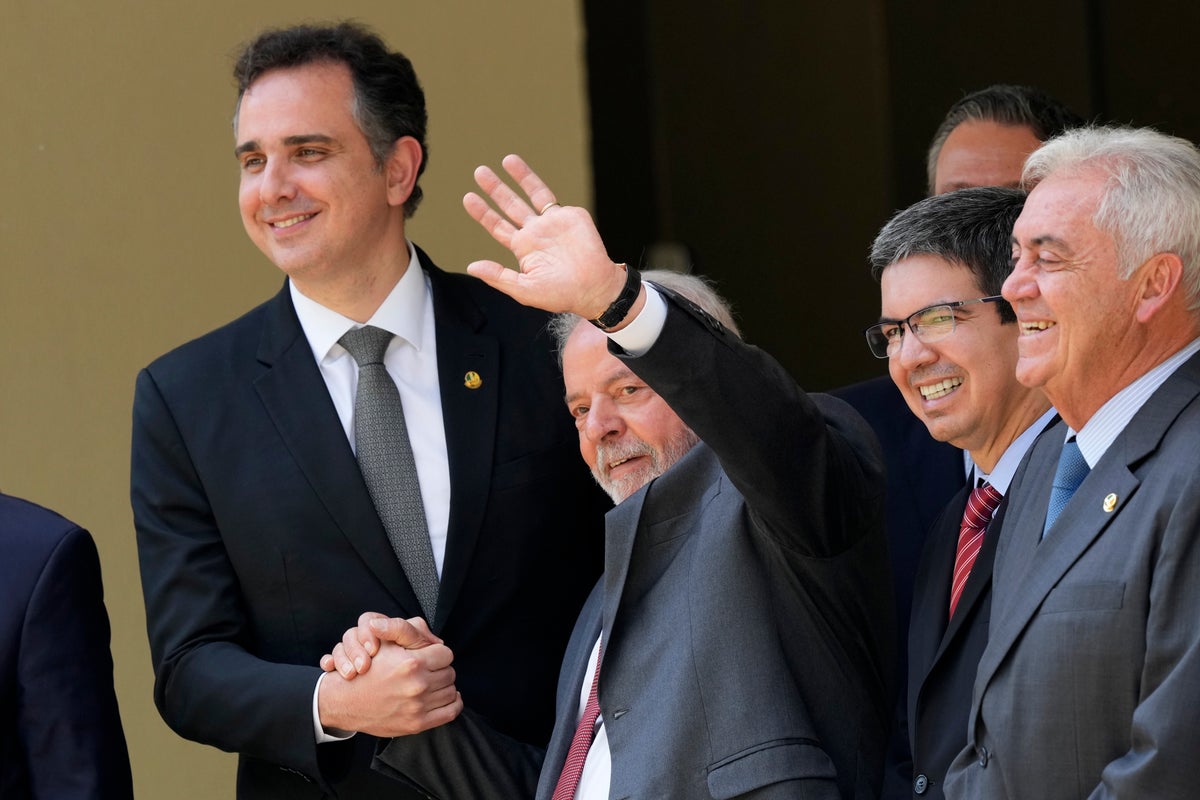
Brazilian lawmakers on Wednesday voted to reelect the heads of both the Chamber of Deputies and the Senate, bolstering President Luiz Inácio Lula da Silva's prospects for passing legislation and governing in the polarized nation.
Chamber Speaker Arthur Lira won in the biggest landslide since Brazil returned to democracy almost four decades ago, with 91% of the votes. Senate President Rodrigo Pacheco secured victory with a sizeable margin, outdoing analysts' expectations for a tight contest and even possible upset by his challenger.
Neither are outright allies of Lula, who assumed office Jan. 1, but the leftist president backed their candidacies and has been distributing Cabinet positions and other appointments to shore up votes. In the Senate, his effort aimed to rout the bid of Sen. Rogério Marinho, who was a minister in the government of Lula's far-right predecessor, Jair Bolsonaro.
The two congressional leaders play important roles in Brazil's democracy. They set the daily agenda for proceedings, choosing which bills are put up for debate and vote, and they have the power to greenlight congressional investigations.
The Chamber of Deputies' speaker also can trigger impeachment proceedings against the president — which Bolsonaro allies have already called for Lula to face — or sit on requests indefinitely. The Senate president can do the same for Supreme Court justices, some of whom Bolsonaro and his supporters have fiercely criticized.
When Lira became speaker three years ago, he promised to remain neutral amid deepening political animus. He later became a staunch Bolsonaro ally, however, and refused to give his go-ahead for any of the roughly 150 requests for impeachment proceedings targeting the then-president. He also backed Bolsonaro's 2022 reelection campaign.
Such support came largely in exchange for Bolsonaro allowing Lira to steer federal funds to lawmakers for allocation as they pleased, without specifying amounts or destinations, said Sérgio Praça, a political analyst at the Getulio Vargas Foundation, a university and think tank. Local media dubbed it the “secret budget,” given its lack of transparency, and critics have said it facilitated systematic corruption.
Lula railed against the mechanism on the campaign trail, and promised to scrap it. When Lula won, however, Lira was the first prominent Bolsonaro ally to publicly recognize the results — an important gesture, given that the incumbent had been sowing doubt in the nation's electronic voting system for months and never conceded defeated.
“When Lira has something to gain, such as access to resources and positions, his posture tends to be pro-government,” said Mayra Goulart da Silva, a political scientist at the Federal University of Rio de Janeiro.
In December, the Supreme Court ruled that the “secret budget” is unconstitutional. Lira said in an interview on Jan. 31 with the television network GloboNews that ending it will make it harder for Lula to negotiate with Congress.
His outstanding performance in the Wednesday vote was viewed by analysts consulted by The Associated Press as stemming from his prowess in securing allies with favors and leading the Chamber of Deputies through several crises with a steady hand.
“He has the capacity to articulate, which creates an almost irrefutable situation that (Lula’s) Workers’ Party saw it could not compete against,” said Creomar de Souza, political analyst at Dharma Politics.
Lira and the Workers’ Party's leader in the Chamber of Deputies have said that for the next year a party member will lead the Constitution and Justice Committee, a highly sought position because the body must approve any significant legislative proposals before they are put to a vote. That includes the tax reform Lula's finance minister has said he intends to present in the first half of this year, as well as an increase to the minimum wage and managing the government's budget for other social initiatives.
Lula's outlook appears more complicated in the Senate, where members are free to make individual agreements, unlike in the Chamber of Deputies, and battle lines more clearly reflect the nation's polarization, analysts and senators said. Bolsonaro, who has been in Florida since Dec. 30, said at an event in Orlando on Tuesday that he had been calling senators and asking them to vote for Marinho in the failed effort to unseat Pacheco.
Pacheco sold himself as a staunch supporter of democracy in the wake of the Jan. 8 rampage through the federal government's most important buildings by supporters of Bolsonaro seeking to overturn the election. In his victory speech Wednesday, Pacheco told senators that “democracy is still standing” and that “toxic polarization must be erradicated.”
“We must abandon the discourse of us against them, and be on the right side of history,” he said.
Sen. Carlos Viana, a member of Bolsonaro’s party, said Marinho's candidacy was intended, among other things, to hold Supreme Court justices to account for allegedly overstepping their authority, for example by blocking social media accounts ofright-wing lawmakers for supposedly anti-democratic statements.
Marinho would have put the Senate “at the center of discussions in matters that we believe go beyond the Supreme Court’s attributions,” Viana said.
He added that right-wing senators won’t automatically vote against Lula administration proposals that can benefit the country, such as “a good” tax reform.







